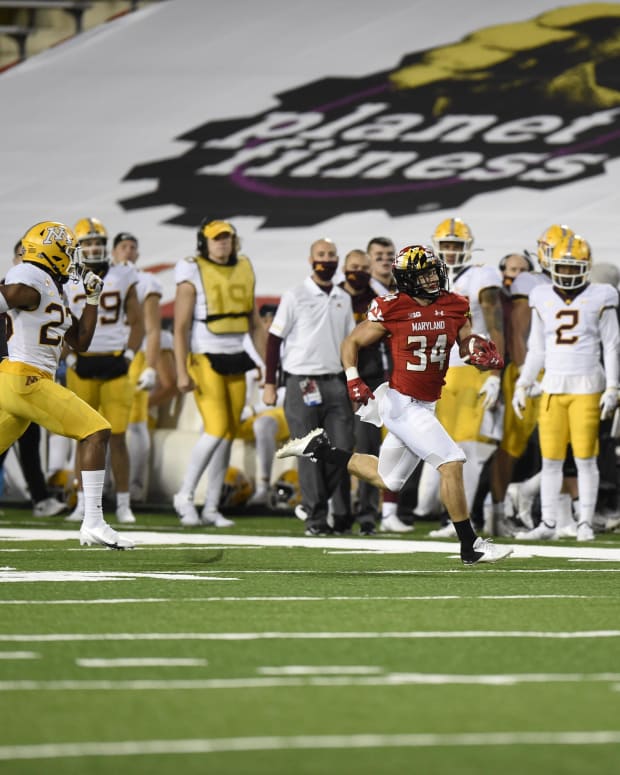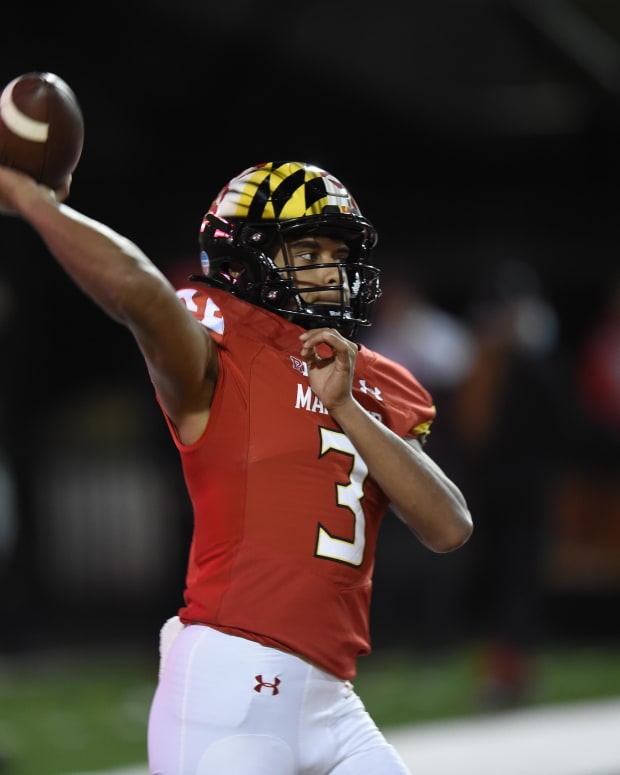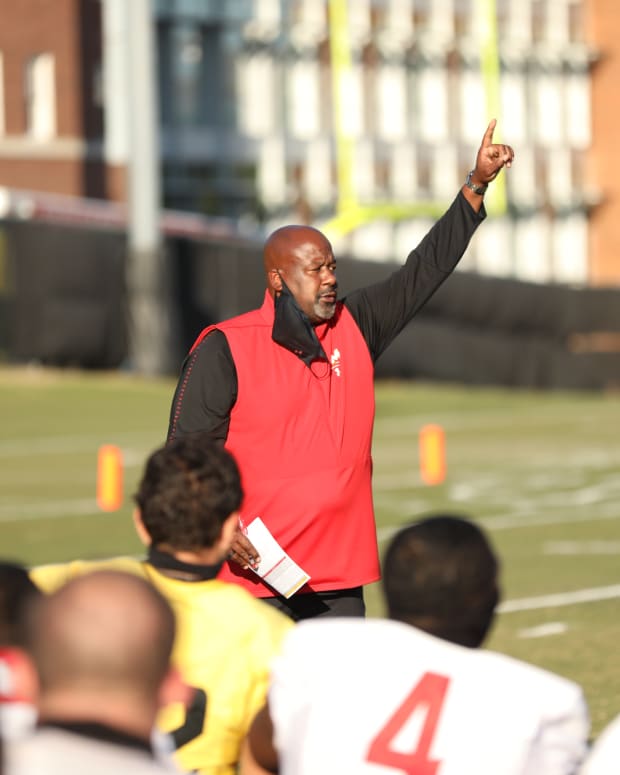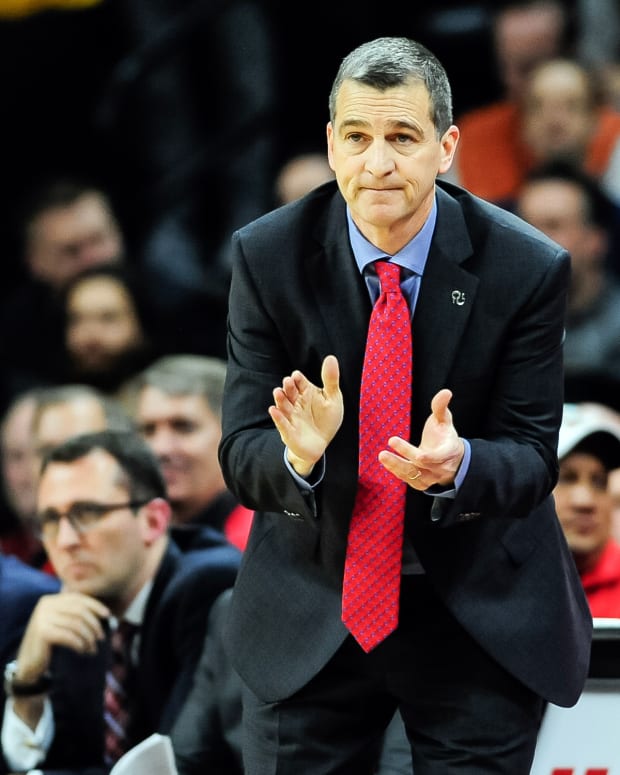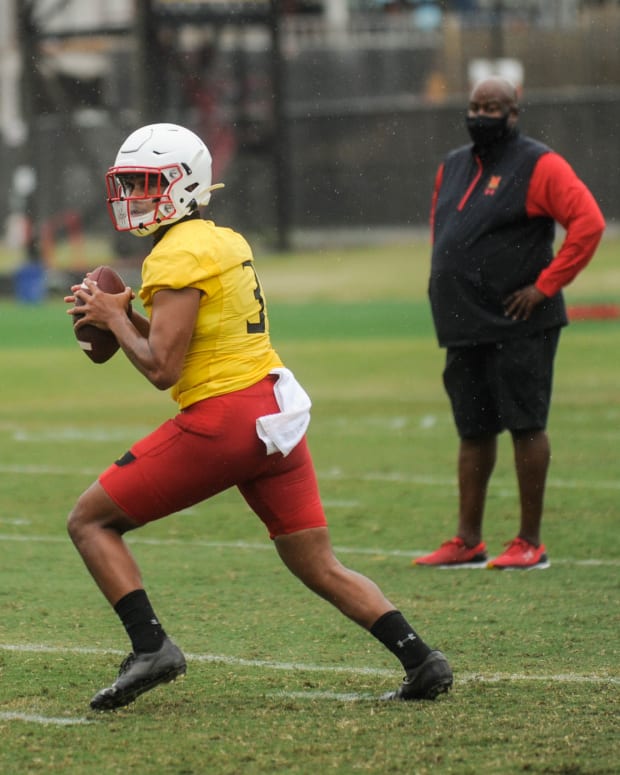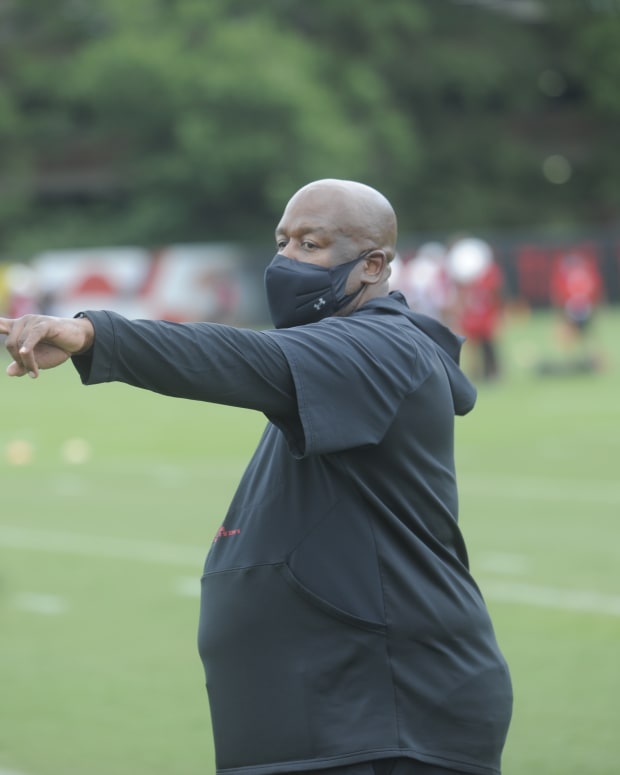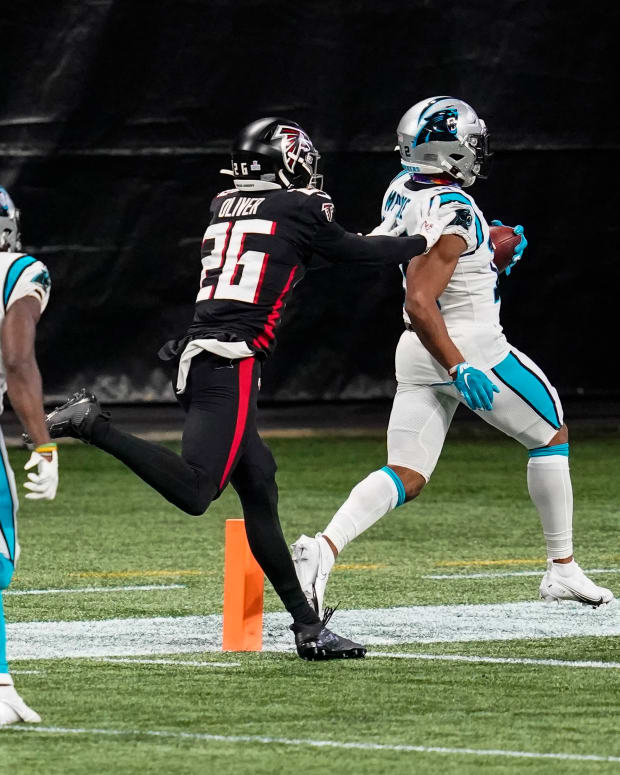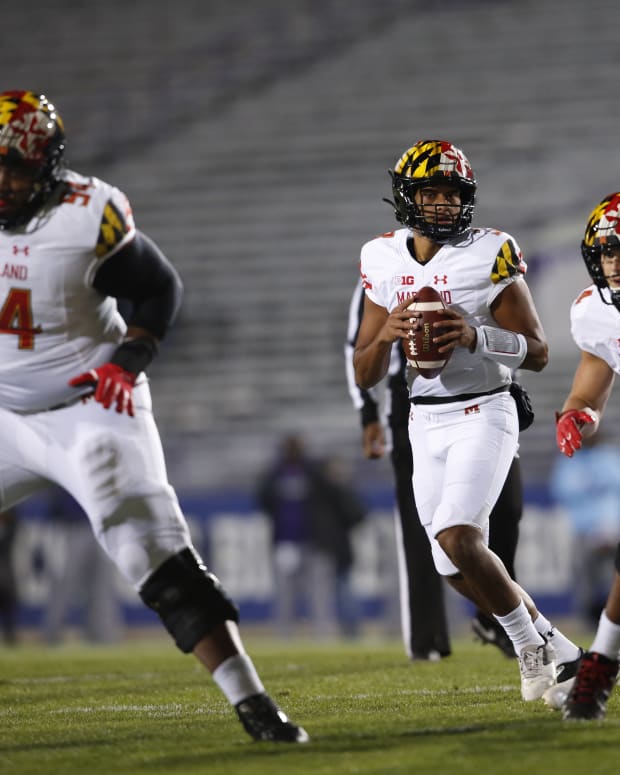Damon Evans, Mike Locksley and Doctor Rooks Explain Return for Fall Football, Health Protocols
The Big Ten formally announced plans for football to return to competition beginning the weekend of October 23 as Maryland moves forward with a fall season. Athletic Director Damon Evans, head team physician and assistant director to the University Health Center Dr. Yvette Rooks and head coach Mike Locksley held a virtual press conference on Wednesday afternoon as they displayed their excitement for the new decision.
"The Big Ten did announce that Big Ten football will resume here in October. Football is back in the Big Ten," Athletic Director Damon Evans said. "As you can imagine, our student-athletes, as well as our staff and coaches are excited about this opportunity to resume play. This is important for our staff, it’s important for our coaches, and it’s important for our student-athletes as we move forward - as well as to this university as a whole. I know that our student-athletes in the sport of football are eager to get back to doing what they love to do, and that’s playing football. But as the conference made a decision to look at return to play, I want to stress that this decision was made under the guidance of medical professionals. The health, the safety, and the wellness of our student-athletes remained paramount and at the forefront of the decision-making process. Under the leadership of our medical professionals, we were able to come up with a set of protocols that are very comprehensive in nature, and position us to move forward, but most importantly, position us to help mitigate the spread of COVID-19 and to take care of our student-athletes.
The news comes on the same day that Maryland athletics announced a total of 35 positive COVID-19 cases as seven of the university's twenty programs remain suspended from resuming workouts. Dr. Rooks explained Maryland's process for quarantining the respective student-athletes as administration hopes to minimize spikes.
“We’ve already been handling that, and we’ve done a very good job with that, partnering with residential life and campus services," she said. "Once we identify someone who is positive, they immediately get removed and they go into what is called an isolation dorm, which is Old Leonardtown. They are there with their own bathroom and own room for a period of 10 days as long as they remain asymptomatic. If they are symptomatic, they stay there longer until their symptoms resolve, and then they can come out and start our return to play cardiovascular workup, and then activities.”
Head coach Mike Locksley showed exuberance for the decision as the program moves into year two under the new regime.
"As you know and I’ve talked about this all along, one of the things I’ve tried to do from March 12th when this thing first started was for our team to maintain the mindset of whatever the day allows us to do that’s how we’ll handle and manage it. And we understood because this is something that has never, we’ve never had to deal with before, not just in society but in sport, the team that is able to adjust, the team that is able to be fluid will be the team that when the gates open, as I like to say to our team will be prepared to go out and do the best job we can, taking the next step as a program. So we tried to maintain an even keel with this thing, we tried not to worry about what we read in the papers and all the outside noise as we like to call it in the football family. And whatever rules are given to us by the medical staff and our administration, those are the things we put all of our energy and attention to. We were able to utilize very early the meetings via Zoom and then when we were able to get on the field taking full advantage of those opportunities with the hopes that someday we would come to where we are today. And I can tell you we are excited moving forward."
AD Damon Evans on protocols in place for 2020 season
“I want to take a brief moment to share some of those protocols with you. First and foremost, the conference looked directly at testing. A point of care daily antigen testing that our student-athletes will do six to seven days a week. Should a student-athlete receive a positive test on the antigen test, there will be a confirmatory PCR to back that particular test up. So we’re excited about those options for us to test on a regular basis, and help to mitigate the spread of this virus. In addition to that, the conference looked at cardiac screening. A lot of us have heard about - how does this affect the cardiovascular system? What we decided to do was put protocols in place to address those issues. One of the things that we’re doing in the cardiac screening, first and foremost, is an echocardiogram on all of our student-athletes who test positive for COVID. In addition, they will have an ECG [electrocardiogram] as well as a blood troponin test. But what is really important - just as important as the three that I just mentioned- is the cardiac MRI, that gives you a visual of the heart. This screening process is extremely comprehensive, and puts our student-athletes in the best positions if issues may arise. I should note that in this screening, should a student-athlete test positive for COVID, the earliest that he would be able to return to competition is 21 days. And again, this is done out of an abundance of caution. As we continue to move forward, we felt that data was going to play a significant factor in helping us make decisions in setting some parameters around return to play and competition. Each institution is identifying a chief infection officer that will be responsible for collecting and reporting data as it relates to the team positivity rate as well as the population positivity rate. These are very important as decisions will be made as it relates to if we can continue to practice and/or compete moving forward. Another big factor in all of this is contact tracing, and to make sure that we have a comprehensive approach to contact tracing. I am very excited that we have parameters in place to protect the health, safety, and welfare of our football student-athletes. As I stated earlier, this was paramount. I’m very pleased, as Brian [Ullmann] indicated, one of the key members of that medical subcommittee that helped to lay out these protocols is our very own Dr. [Yvette] Rooks, who joins us here on this Zoom call today. Her efforts were outstanding and really helped us lead the charge to set up medical procedures and protocols that would be in the best interest of all of our student-athletes. As we all know, college football plays a significant role in a university’s setting. It is not the most important thing, but it is something that people can come rally around, we can support the educational endeavors of the institution, and give us a point of pride as we move forward. Again, we’re excited to be back.”
On ethical concerns of giving so much resources to the athletic department/teams and not to the general students & who is paying for daily, rapid testing:
On what will be done for athletes that have previously opted out:
AD Damon Evans on financial impact of playing football:
AD Damon Evans on the nine-game schedule and what the contingency plan is:
“Okay, that is a very, very good question. Obviously, we have not released a schedule yet. There is consideration being given to eight to nine games out there, we'll continue to evaluate that knowing that we need to get a schedule out here sooner rather than later. But, one of the things that we are, we feel good about, is daily testing. We hope this will put us in a position to really be able to contact trace and, to more specifically provide a clean practice area and a clean field; and limit the spread of the virus amongst teammates moving forward. So, we will deal with things as they come. Obviously, it is going to be a tight window for us based upon how we decided to come back in play. So, once we get that schedule set, which it is not set yet -when we get to take a look at that schedule, then we'll have to start having further discussion on what happens if this goes awry or if that goes awry.”
*Note: per Emily Giambalvo of the Washington Post, "a Maryland spokesman clarified that the conference will be paying for tests. But because of how Big Ten revenue trickles down to the schools, a cost at the conference level would presumably also lead to schools receiving a smaller distribution."
Head Coach Mike Locksley on the possibility of playing in front of no fans:
“All along we knew that that was a possibility. When we take a look across the country in the sports that are in play right now, fans have really really been limited. We wanted to make sure that we worked with our local county government and the state government to do what's most appropriate to protect our communities as we move forward, so we knew that was a possibility all along. We were more focused on trying to get the medical protocols in place, that would protect our team and allow our team to get back to competing so it will be a little bit different without fans, but I know I receive a lot of text messages and emails today from fans, expressing how excited they are about us getting back and the opportunity to watch the Terps on TV.”
AD Damon Evans on if & how Jordan McNair's death factored into the decision to play:
“That’s a very good question, because obviously the tragic death of Jordan McNair is something that we never forget around here. We've had to learn from that, and move forward. It’s at the forefront. The health and safety and the welfare of the student athletes is the forefront. I did have conversations at the conference level, when we were discussing this issue of COVID-19 and the spread, and the unknown complications and the effects that it can have on young people. And when you go through something like we went through at this institution, you’re very mindful. We always have health and safety at the forefront, but it becomes even more paramount now. I felt it was necessary for me to share that with my colleagues in the Big Ten, so that they would understand what we were dealing with, and all along we at the University of Maryland, as much as we wanted to play football in all of our sports this year - they weren't going to be played unless we felt comfortable that we were in a position, not only as an institution, but as a conference, to move forward in a safe manner. Today, we feel good that we're in that position and we feel good, because we have a great medical team headed up by Dr. Rooks.”
Get the latest Maryland news by joining the community. Click "Follow" at the top right of our All Terrapins page. Mobile users click the notification bell. Follow @SIAllTerrapins on Twitter
